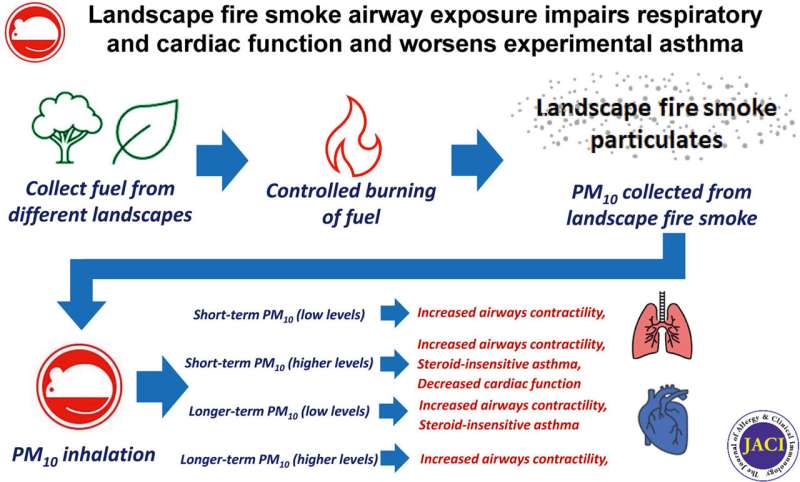This article has been reviewed according to Science X's editorial process and policies. Editors have highlighted the following attributes while ensuring the content's credibility:
fact-checked
peer-reviewed publication
trusted source
proofread
Researchers provide platform to help understand how bushfire smoke harms the lungs and heart

A team of researchers led by Professor Jay Horvat and Dr. Henry Gomez have developed a world-first platform to define the impact of exposure to landscape fire smoke on the heart and lungs.
The researchers found that short and long-term exposure to landscape fire smoke particulate matter (bushfire smoke) increased the hyperresponsiveness of airways and induced steroid insensitivity in experimental asthma.
They also found that short-term exposure to bushfire smoke decreased cardiac function and this is associated the expression of gene changes relating to oxidative stress and cardiovascular pathologies.
The research was driven by the events of the 2019 and 2020 "Black Summer" bushfires.
Professor Horvat explains, "Millions of people in Australia were exposed to unprecedented levels of particulate matter from landscape fires. This was associated with large increases in people having respiratory and cardiovascular symptoms. People with asthma experienced worsened disease symptoms and had an increased need to seek medical help as a result of exposure to particulate matter generated by the fires. Furthermore, the number of heart attacks almost doubled in regional locations during the 2019/2020 black summer period."
The paper, "Landscape fire smoke airway exposure impairs respiratory and cardiac function and worsens experiential asthma," by Professor Horvat and Dr. Gomez, published in The Journal of Allergy and Clinical Immunology, describes a world-first platform for understanding how landscape fire exposure affects heart and lung physiology. This research will be used to help identify therapies to protect people from the harmful effects of exposure.
"Our research demonstrates that even small amounts of physiologically relevant particular matter from landscape fire smoke has significant effects on lung and heart physiology, worsening key features of asthma and preventing mainstay suppressant medications from having much of an effect on symptoms," says Professor Horvat.
Professor Horvat says, "What our experience showed us during the black summer bushfires is that completely avoiding exposure to landscape fire particulate matter inhalation is almost impossible.
"Our research shows that exposure to even low amounts of landscape fire particulate matter over a short period of time has a significant effect on heart and lung function. Therefore, new therapeutic strategies are required to protect people from the harmful effects of exposure, particularly for those who are at increased risk such as those with asthma or cardiovascular disease.
"Better strategies for treating and preventing the harmful effects of landscape fire smoke exposure are going to become more important given that the prevalence and intensity of landscape fires is likely to increase globally as a result of climate change."
"Our findings show that particulate matter generated from different fuel sources have very similar effects at the same level of exposure. However, more research is required to determine how different levels of particulate matter generated from different fuel sources in different geographical regions and countries affect different populations of people, especially those with underlying respiratory and cardiovascular conditions," says Professor Horvat.
"Furthermore, while our findings show that targeting airway smooth muscle contraction or oxidative stress pathways may provide novel strategies for protecting against the effects of landscape fire inhalation on respiratory and cardiovascular disease, more studies are required to identify appropriate therapies."
This research was conducted in collaboration with the Asthma and Breathing research program led by Professor Peter Gibson and Professor Vanessa McDonald, and National Heart Foundation Future Leader Fellow from the HMRI Heart and Stroke program, Professor Doan Ngo.
More information: Henry M. Gomez et al, Landscape fire smoke airway exposure impairs respiratory and cardiac function and worsens experimental asthma, Journal of Allergy and Clinical Immunology (2024). DOI: 10.1016/j.jaci.2024.02.022


















